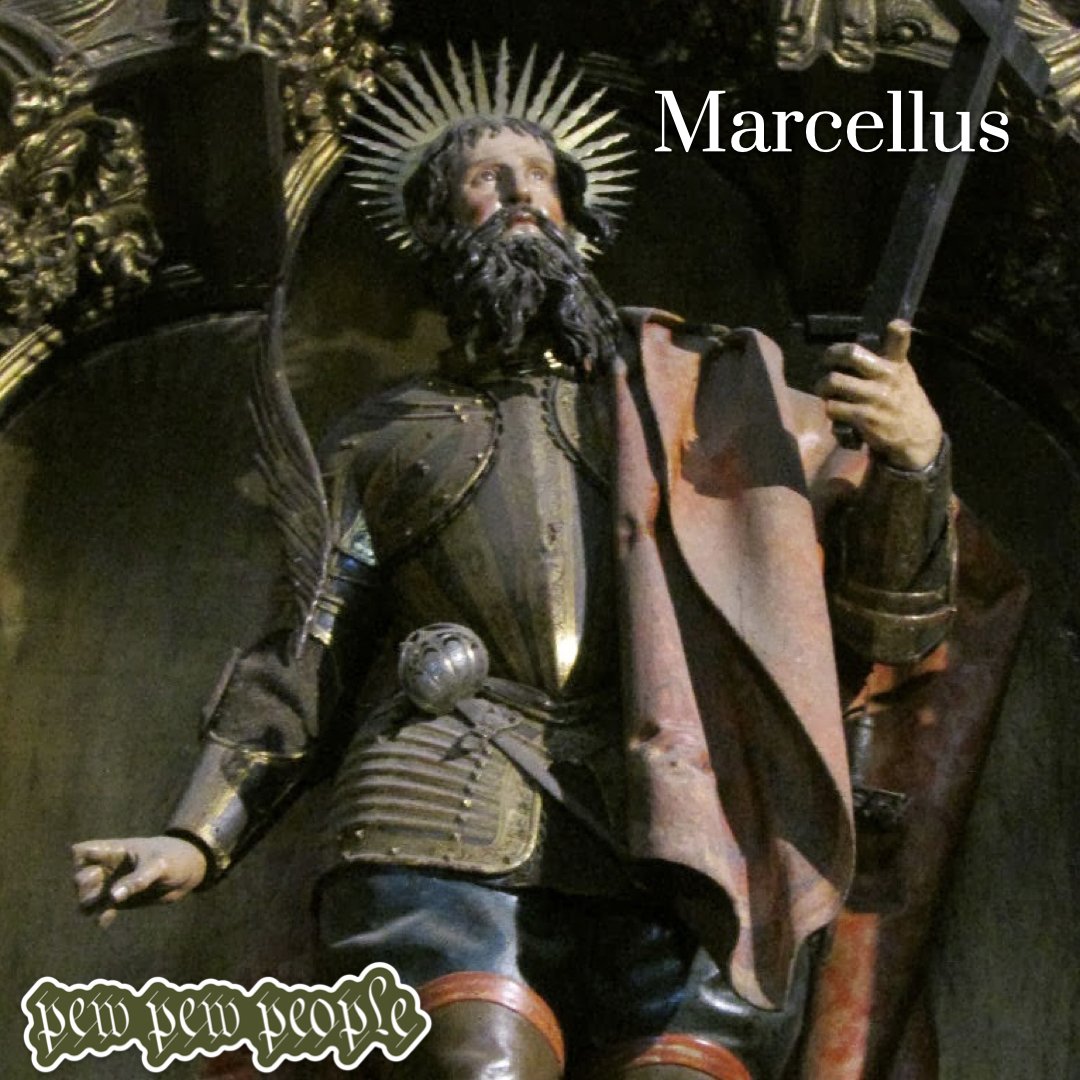Marcellus of Tangier
🗓️ Oct 30th
Marcellus was said to have been a centurion stationed at Tingis (modern-day Tangiers) who refused to participate in the general birthday celebrations of Emperor Maximian, which would have entailed sacrifice to the Roman gods. In 298 C.E., Marcellus threw off his military belt, weapons, and vine staff (the insignia of his rank) and was soon brought before a judge named Fortunatus. The judge remanded Marcellus to lay his case before Maximian and Constantius; the latter was friendly to Christians. However, Marcellus was taken to the deputy Praetorian prefect Aurelius Agricolanus, instead. Marcellus pleaded guilty to repudiating his allegiance to an earthly leader.
Mandatory Fun:
Start with his Wikipedia page
Butler’s Lives of the Saints, Vol. X (see below)
Lanata, G. "Gli atti del processo contro il centurione Marcello", Byzantion 42 (1972), 509-522. David Woods has translated this work, also known as BHL 5255a.
His relics are kept at the Basilica of the Sacred Heart at Notre Dame University in South Bend, IN, which used to host an annual Marcellus Day pilgrimage and dramatization of his passion based on BHL 5255a.
From the authentic acts of his martyrdom in Baronius and Surius, and most correctly in Ruinart, who has published with them the short acts of St. Cassian, p. 312, Tillem. t. 4, p. 575.
THE BIRTH-DAY of the emperor Maximian Herculeus was celebrated in the year 298, with extraordinary feasting and solemnity. Pompous sacrifices to the Roman gods made a considerable part of this solemnity. Marcellus, a Christian centurion or captain of the legion of Trajan, then posted in Spain, not to defile himself with taking part in those impious abominations, cast away his military belt at the head of his company, declaring aloud that he was a soldier of Jesus Christ, the eternal King. He also threw down his arms and the vine-branch, which was the mark of his post of centurion; for the Roman officers were forbid to strike a soldier with any instrument except a vine-branch, which the centurions usually carried in their hands. The soldiers informed Anastasius Fortunatus, prefect of the legion, by whose order Marcellus was committed to prison. When the festival was over, this judge ordered Marcellus to be brought before him, and asked him what he meant by his late proceedings. Marcellus said, “When you celebrated the emperor’s festival on the 12th before the calends of August, (the day on which Maximian had been declared Cæsar,) I said aloud that I was a Christian, and could serve no other than Jesus Christ, the Son of God.” Fortunatus told him that it was not in his power to connive at his rashness, and that he was obliged to lay his case before the emperor Maximian and Constantius Cæsar. Spain was immediately subject to Constantius, who was at that time Cæsar, and most favourable to the Christians. But Marcellus was sent under a strong guard to Aurelian Agricolaus, vicar to the prefect of the prætorium, who was then at Tangier, in Africa. Agricolaus asked him whether he had really done as the judge’s letter set forth: and upon his confessing the fact, the vicar passed sentence of death upon him for desertion and impiety, as he called his action. St. Marcellus was forthwith led to execution and beheaded, on the 30th of October. His relics were afterwards translated from Tangier to Leon in Spain, and are kept in a rich shrine in the chief parish church in that city, of which he is the titular saint. 1 Cassian, the secretary or notary of the court, refused to write the sentence which the vicar pronounced against the martyr, and threw his pencil and table-book on the ground. Agricolaus, rising in a rage from his seat, asked him why he behaved in that manner? “Because,” said Cassian, “the sentence which you have dictated is unjust.” He was immediately hurried to prison, and examined again about a month after. The firmness with which he defended his former answer procured him the crown of martyrdom. He was beheaded on the 3rd of December. These two martyrs are mentioned in the Roman Martyrology on their respective days. 2 We justly honour the martyrs, whom God himself honours. Martyrdom is the most heroic act of divine love, and the most perfect and entire sacrifice man can make of himself to God. Of all the goods of this life, man has nothing more precious and dear than his life and honour. And what stronger proof can he give of his fidelity to the law of God than to embrace with joy an ignominious and cruel death rather than consent to sin? Nor does any thing require a more heroic degree of courage and firmness than to suffer torments at the very thought of which nature shudders. God proportions his rewards and crowns to the measure of our sufferings and love for him. How great then, is the glory, how abundant the recompence which attends the martyrs! They rejoiced to see their torments redoubled manifold, because they had before their eyes the incomparably greater increase of grace, divine love and eternal glory. If we shrink under the least sufferings, it is plain our faith and our idea of everlasting bliss must be very weak, and our love faint and imperfect.

